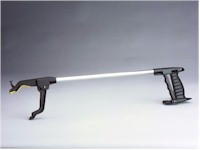This exploration was brilliant. It allowed for clear and undiluted use of devices that rely on obvious physical manipulation. This will help in the design of our interaction design project.
As can be seen in the pictures below, by simply playing with objects around LifeTec, we were able to see interaction in the flesh, and get realistic ideas of just what we could do as well as how you could use devices..
LifeTec Home Page
LifeTec Activity:
At LifeTec, we were asked to contribute on a interesting design activity which aimed to explore these universally designed products, yet at the same time, help us understand and explore interaction strategies. The task involved taking a well designed assistance device available in the LifeTec and redesigning it, with the aim of making it better (i.e. adding features and functionality) and improving the interaction element.
What We Did and Our End Result:
The product we had to redesign was a Homecraft Claw Reacher, an assistive device which is designed to help users reach, pull, twist and otherwise manipulate objects. The device is to be used in a variety of situations, in a variety of contexts.
 |
| Homecraft Claw Reacher |
 |
| Our Redesign |
However, this movement requires a relative amount of physical strength and dexterity in the hand, but at the same time movement and strength through the arm, shoulder and back. We thought, how could someone accomplish these tasks while having even less or no mobility? (i.e. even more restrictions on a persons mobility). Also, at the same time, we thought how could we also enhance existing interactions and add features/functionality.
We believed we accomplished this by adding new technology into the device. The device would be operated electronically and mechanically without the need for any physical strength to help pick things up. The interaction would also ensure a perfect and solid grip on a product. The product could also rotate and manipulate objects on several different axises. This would allow for the completion of more complex, specifics and exact tasks.
Other Team Members Work:
Other Team Members Work:
As you can see, other group members also enhanced and focused on the functionality of the product, while also incorporating elements of our interaction design studies into these ideas. An Interesting example included the "medical reminder system" which included an LED indicators and other interactive elements which improved the design.










No comments:
Post a Comment